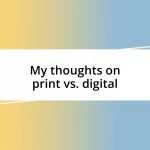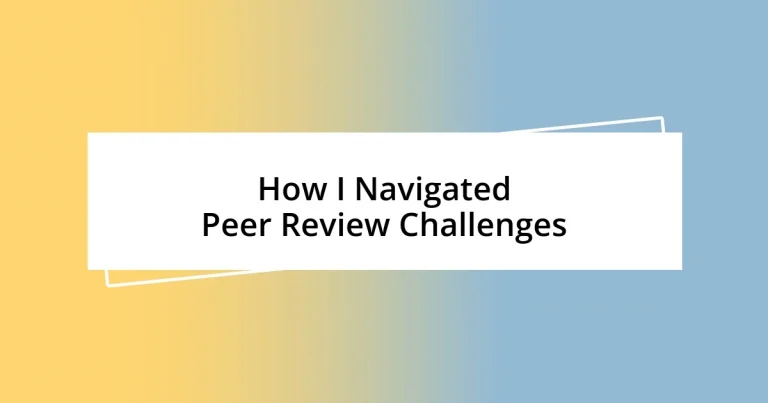Key takeaways:
- The peer review process should be seen as an opportunity for growth, where constructive criticism can refine ideas and strengthen arguments.
- Building positive relationships with reviewers transforms critique into a collaborative dialogue, fostering mentorship and support within the academic community.
- Maintaining a positive attitude and embracing feedback as a pathway to improvement leads to significant enhancements in research quality and personal resilience.
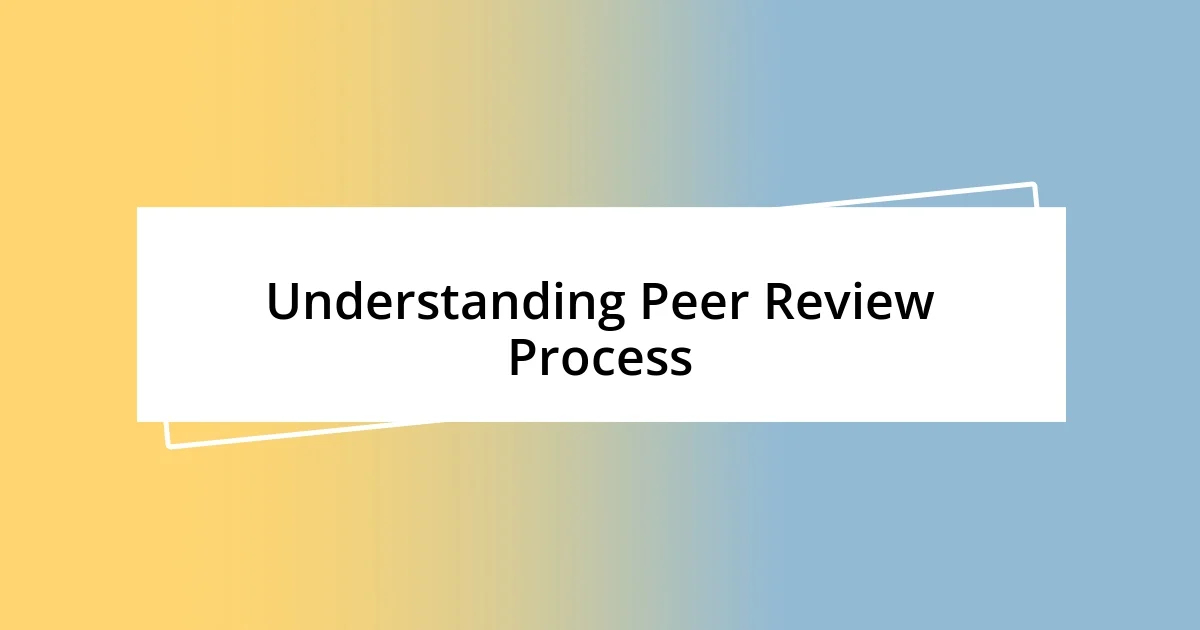
Understanding Peer Review Process
The peer review process can often feel daunting. I remember my first experience feeling like I was stepping into an elite club—one where everyone seemed to know the rules except me. What I learned is that at its core, peer review is about ensuring quality and fostering growth in our work.
As I navigated this process, I realized that feedback—no matter how critical it may feel initially—is a pathway to improvement. Have you ever received comments that made your heart sink? I certainly have. But looking back, those moments of vulnerability were crucial; they pushed me to refine my ideas and strengthen my arguments.
Engaging with reviewers can also bring unexpected rewards. I vividly recall a time I received constructive criticism that sparked a collaborative dialogue. Instead of viewing my reviewers as gatekeepers, I began to see them as mentors invested in my subject. This shift in perspective opened my eyes to the collaborative spirit at the heart of academia.
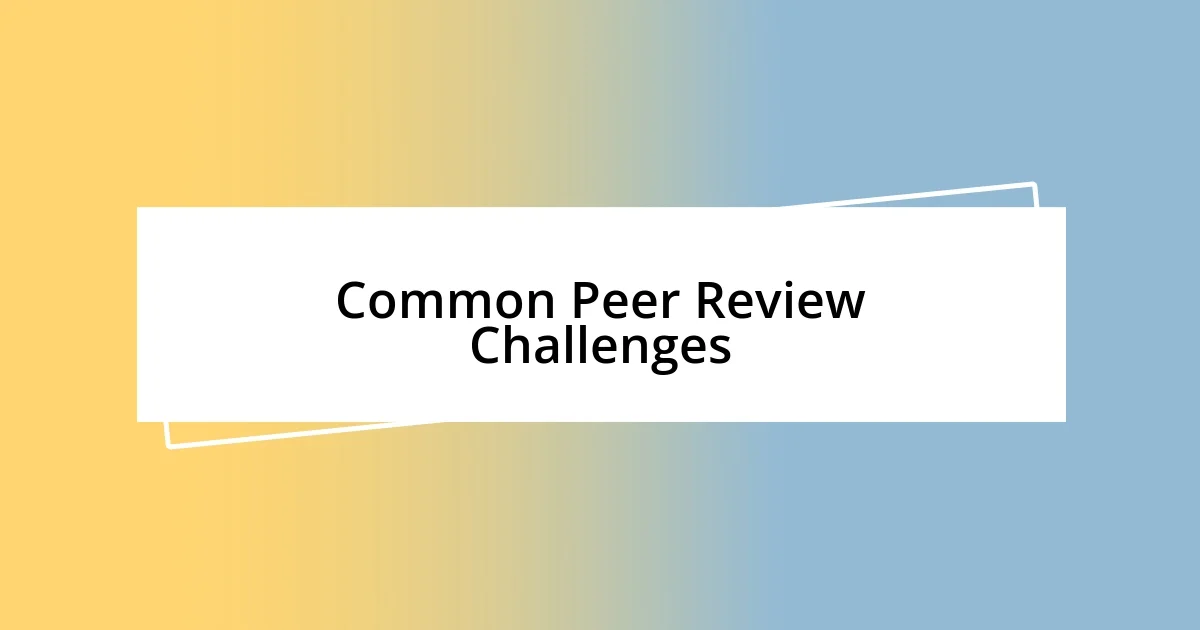
Common Peer Review Challenges
Peer review challenges can be quite varied, and one of the most common issues I faced was the emotional toll it takes on a researcher. There were moments when feedback felt more like personal criticism than professional advice. I distinctly remember a review that left me feeling deflated for days. It’s normal to react emotionally to critiques, but I learned to shift my perspective, reminding myself that the reviewers’ goal is to enhance the work, not to tear it down.
Another challenge is the inconsistency in feedback. It can be baffling when different reviewers provide conflicting opinions. I found myself questioning my own ideas, wondering whose perspective I should trust. After grappling with this for a while, I realized the importance of weighing feedback against my own research goals and values. It helped me clarify my vision and decide what changes truly aligned with my intentions.
Lastly, the timeline for the peer review process can often feel painfully sluggish. I’ve been in situations where I submitted my work, only to be left in limbo for months. That waiting game can stir up doubt and anxiety. Establishing a strong support network helped me; sharing my concerns with fellow researchers reminded me that patience is part of the process and that collaboration often requires enduring these waiting periods.
| Challenge | Description |
|---|---|
| Emotional Toll | Feedback can feel personally critical, leading to emotional responses. |
| Inconsistent Feedback | Contradictory opinions from different reviewers can cause confusion. |
| Long Timelines | The wait for peer review outcomes can create uncertainty and anxiety. |
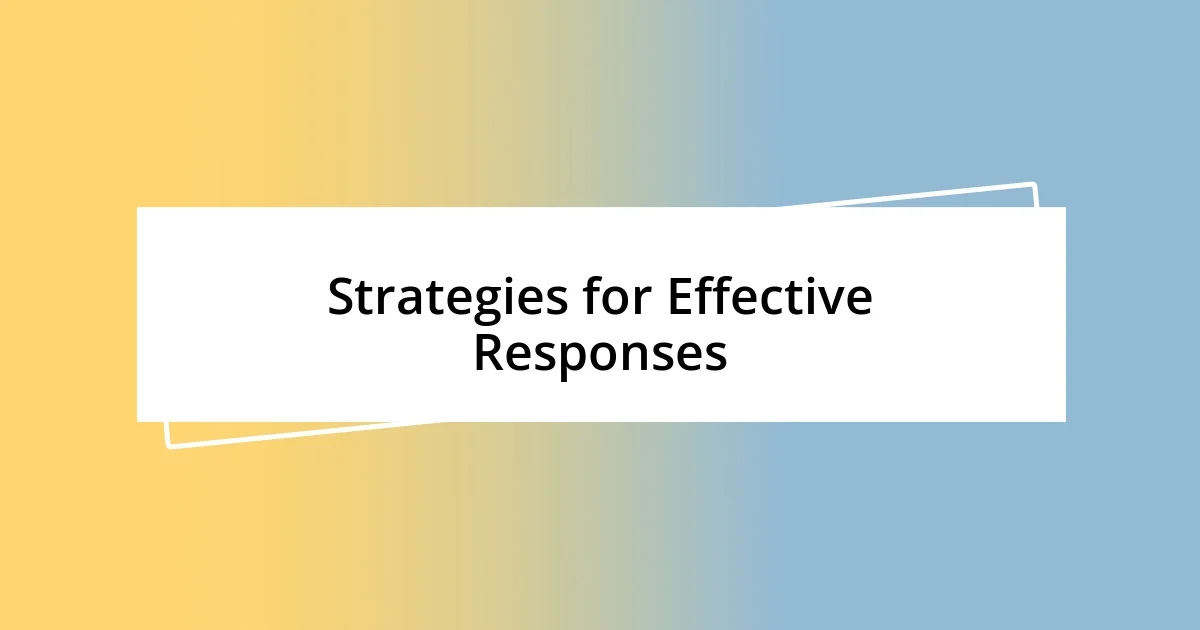
Strategies for Effective Responses
When responding to peer reviews, I found that crafting thoughtful, concise replies is essential. A structured approach not only helps in addressing critiques but also demonstrates your engagement with the feedback. One time, after receiving a particularly tough critique, I took a moment to breathe and organized my thoughts before drafting my response. I laid out the reviewers’ comments, my reflections, and the adjustments I intended to make. This process transformed what felt like a daunting task into a manageable conversation.
Here are some strategies that worked for me:
- **Acknowledge the Feedback:** Start by thanking the reviewers for their insights, showing you value their expertise.
- **Summarize Key Points:** Create a bullet-point list of the main critiques, which helps in ensuring you address each one systematically.
- **Provide Clear Responses:** Clearly articulate how you plan to incorporate each piece of feedback or explain why certain suggestions may not be applicable.
- **Be Open to Dialogue:** Indicate your willingness to discuss further—this can foster a collaborative exchange and can lead to better understanding.
- **Stay Professional and Respectful:** Even if feelings get heated, remembering that reviewers share a common goal of improving your work helps keep responses gracious.
One of the biggest lessons I learned was to maintain a growth mindset throughout the process. There was a particularly challenging review that pointed out gaps in my methodology. At first, I felt defensive, yet after some reflection, I recognized that addressing these gaps would only strengthen my research. In my response, I acknowledged the reviewer’s concerns and detailed my plan for incorporating more robust methods. This openness not only alleviated my initial frustration but also enriched my work, transforming a setback into a substantial advancement.
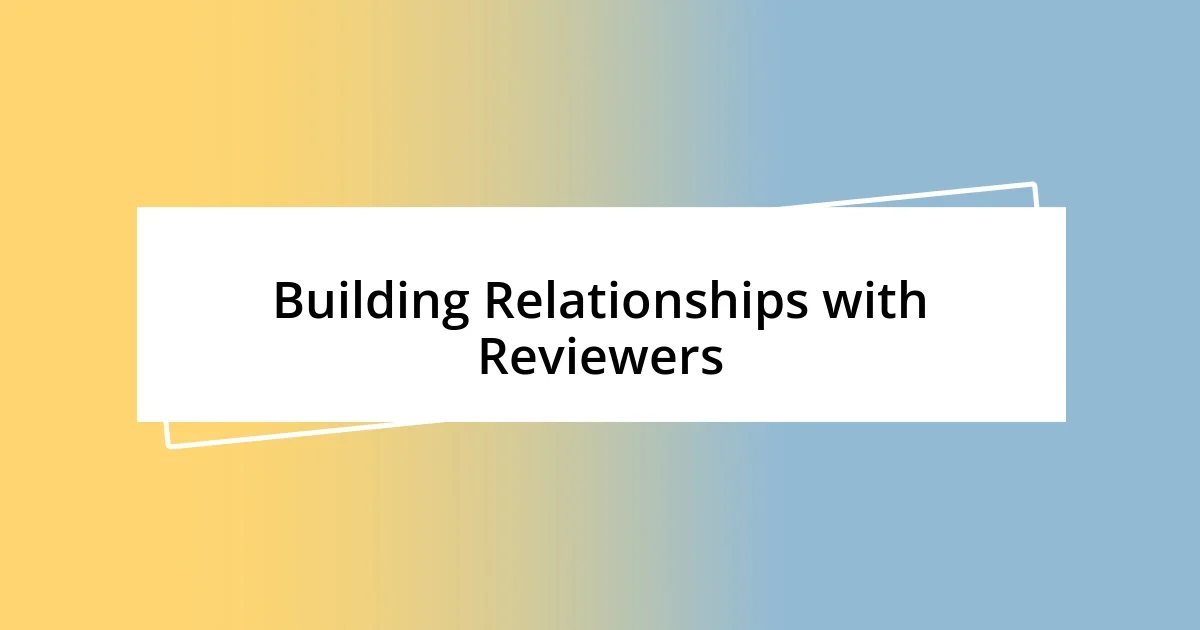
Building Relationships with Reviewers
Building relationships with reviewers has been a crucial aspect of my academic journey. I remember the first time I received feedback; instead of viewing the reviewer as just an outsider, I realized they were someone with a shared purpose: to improve scholarly work. This perspective shift helped me see the value in establishing rapport, which can transform the often daunting process of critique into a constructive dialogue. Have you ever considered how a simple thank you can lay the foundation for future exchanges? Acknowledging their expertise not only fosters goodwill but can create a collaborative atmosphere that benefits both parties.
One effective strategy I adopted was reaching out beyond the formal submission process. After a particularly grueling review, I initiated contact with a reviewer who had provided insightful comments. We ended up discussing broader trends in our field, which not only deepened my understanding but also made me feel more connected to the academic community. Imagine having a go-to person who you can consult for guidance later on! These relationships can lead to mentorship opportunities or even collaborative projects down the line, which I’ve personally experienced as both enriching and rewarding.
It’s essential to remember that reviewers are human too. They understand the challenges we face as researchers. I’ve felt the anxiety of submitting a manuscript, waiting months for feedback, and the subsequent relief when I realized my reviewers were just as eager to see my work thrive. Engaging with them as individuals, rather than faceless critics, has made the entire review process feel less like a judgement day and more like an opportunity for growth. Don’t you think that when we humanize these interactions, it creates a more supportive ecosystem for all?
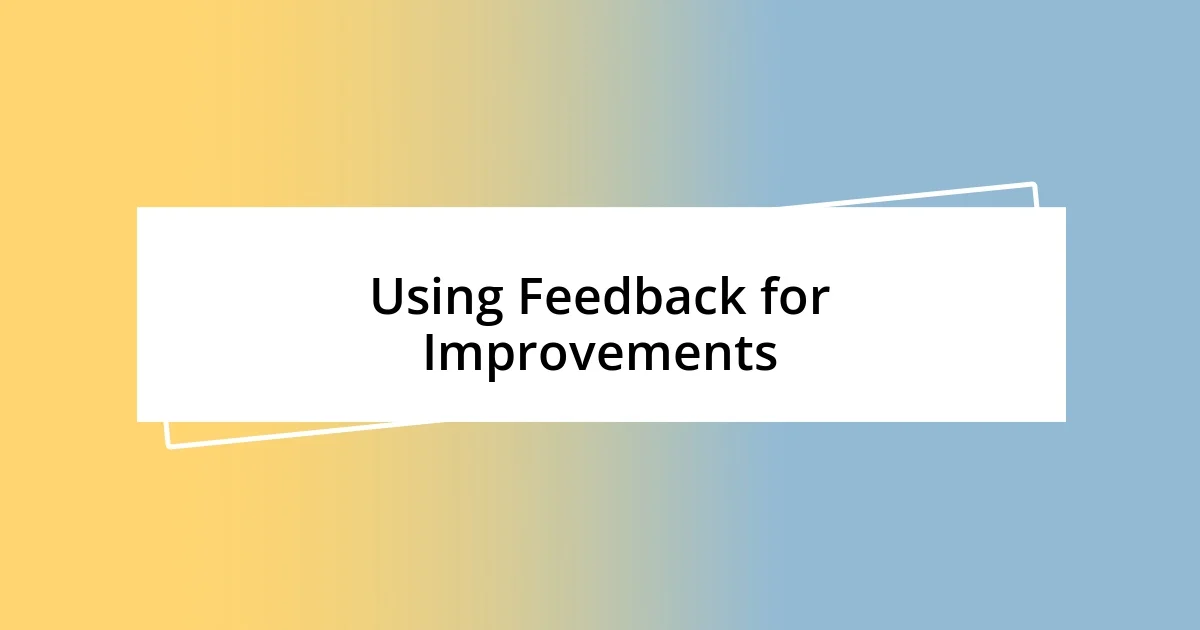
Using Feedback for Improvements
Using feedback effectively is a skill that has significantly shaped my academic pursuits. After receiving a set of comments that pointed out inconsistencies in my work, I remember feeling a mix of disappointment and determination. Instead of brushing off the critiques, I dove deep into each one, reflecting on my own perspective. This willingness to engage with feedback not only improved my manuscript but also reinforced my resolve to pursue clarity and precision in my research.
Implementing feedback is more than just a checklist; it’s an opportunity for genuine transformation. I recall a time when a reviewer suggested a different theoretical framework for my study. Initially, I felt unsure. Yet, after considering their perspective, I spent hours exploring this framework and ended up finding a richer narrative for my research. It was like uncovering a hidden layer that made my work more compelling! Isn’t it fascinating how embracing feedback can lead us to insights we might have overlooked otherwise?
Lastly, I learned that every piece of feedback holds potential for growth, even when it stings. During one peer review, a reviewer pointed out significant gaps in my argument. While my first instinct was to defend my work, I paused and asked myself: what if they’re right? This shift in thinking allowed me to re-examine my arguments with a critical eye, ultimately leading to a stronger, more coherent piece. It feels empowering to know that what feels like a critique can actually be a stepping stone to improvement. How do you respond when faced with critical feedback? Embracing it as a pathway to growth is a journey worth taking.
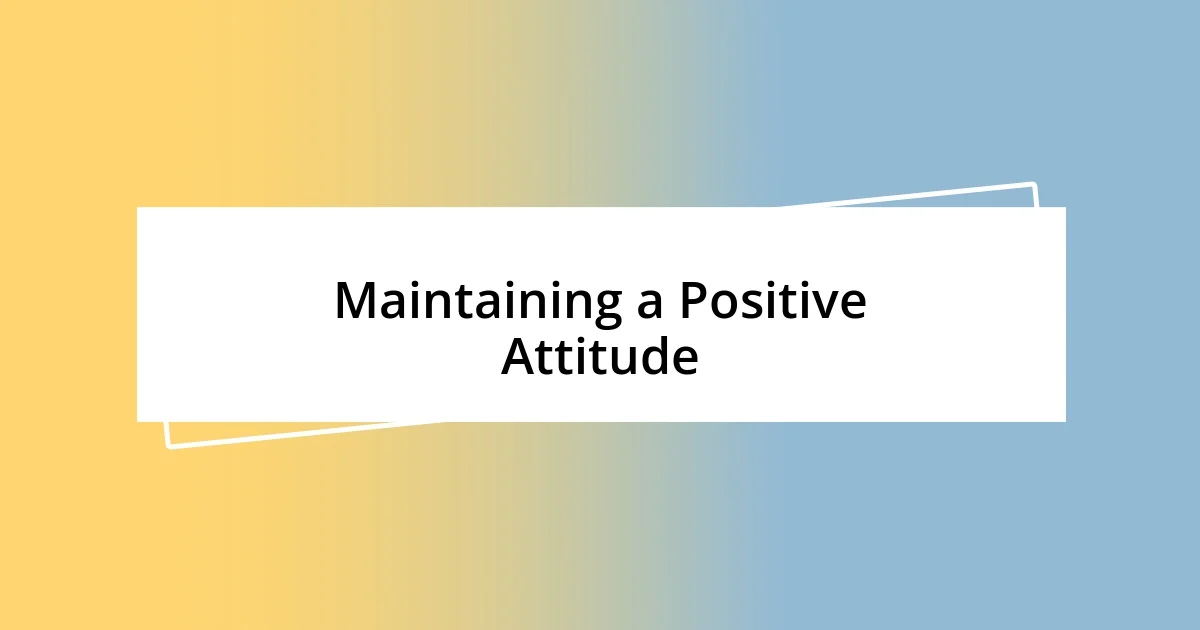
Maintaining a Positive Attitude
Maintaining a positive attitude during the peer review process has been a game-changer for me. I remember a particularly tough review where the critique felt harsh at first. Instead of dwelling on the negatives, I told myself, “This is an opportunity, not a setback.” By flipping my mindset, I found that I could approach each piece of feedback with curiosity instead of defensiveness. Have you tried reframing your thoughts during challenging moments?
I also discovered the power of gratitude. After receiving a less-than-flattering review, I took a moment to acknowledge the time and effort the reviewer had invested. It didn’t just lighten my mood; it also shifted my perspective. Instead of feeling isolated in my struggle, I felt part of a larger academic conversation. Embracing a positive outlook turned my emotional response into a more constructive action. How often do we realize that gratitude can transform our experience?
One of my key strategies has been to focus on the learning aspect of critique. For instance, when I encountered feedback that rattled my confidence, I reminded myself of how far I’ve come in my journey as a researcher. Every critique is a stepping stone; I’ve learned that success is not just defined by acceptance but also by resilience. Seeing peers as allies rather than adversaries has been vital in maintaining that positive attitude. Isn’t it wonderful to think that every piece of feedback is a chance to evolve?
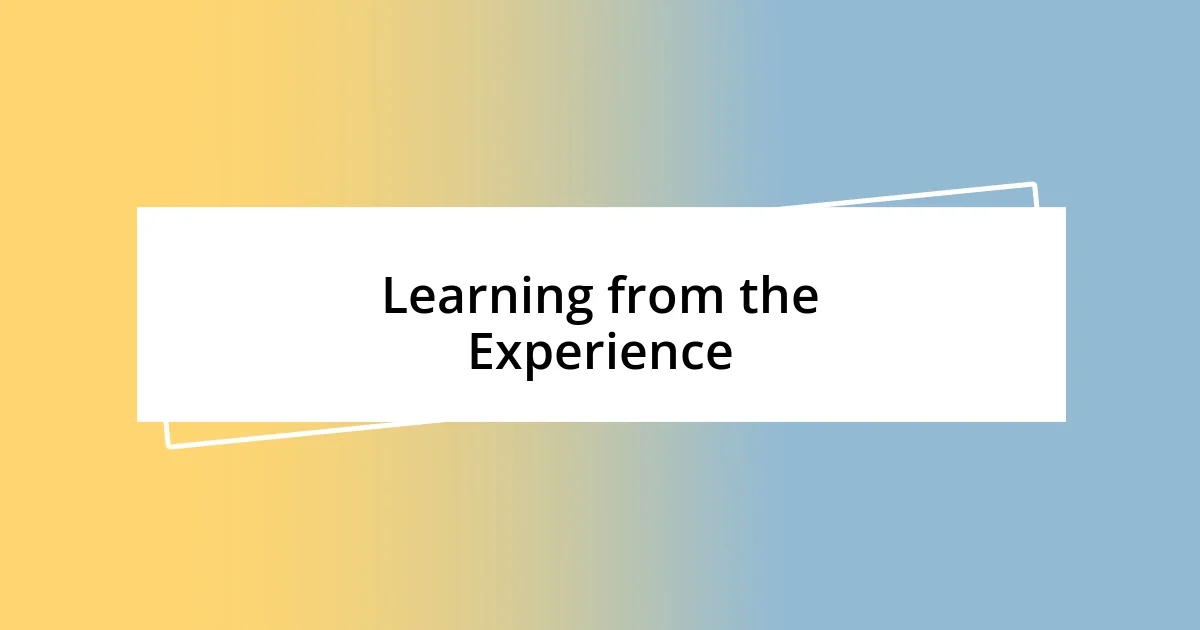
Learning from the Experience
Reflecting on my experiences, I realize that challenges in peer review wield incredible learning potential. One moment that stands out is when I received a reviewer’s comment that simply stated, “This section lacks clarity.” Initially, I felt a wave of frustration wash over me. But instead of locking my ideas away, I rolled up my sleeves. I spent several evenings revising that section, ultimately transforming it into a clear, engaging narrative. It dawned on me that clarity isn’t just about wording; it’s about making my research accessible to others. Have you ever had a moment where a comment pushed you to elevate your work to a new level?
Another key insight I gained was the importance of being receptive to different viewpoints. During one draft, a reviewer recommended that I incorporate a completely different methodological approach. I hesitated at first, feeling rooted in my original plan. Yet, after giving it thoughtful consideration, I found that blending these methodologies introduced depth I hadn’t anticipated. I began to appreciate that stepping outside my comfort zone could lead to innovative solutions. Isn’t it amazing how a single suggestion can open up a world of possibilities?
Ultimately, the experience taught me that every review is an invitation to grow. I remember a particularly challenging submission where my ego took a hit, but instead of wallowing, I approached it as a detective puzzle—what did the reviewers see that I missed? Embracing this mindset shift allowed me to delve into the feedback with an inquisitive spirit. With each critique, I became more adaptable and resilient in my research journey. Isn’t that what we all strive for—to learn and emerge stronger with every challenge?








